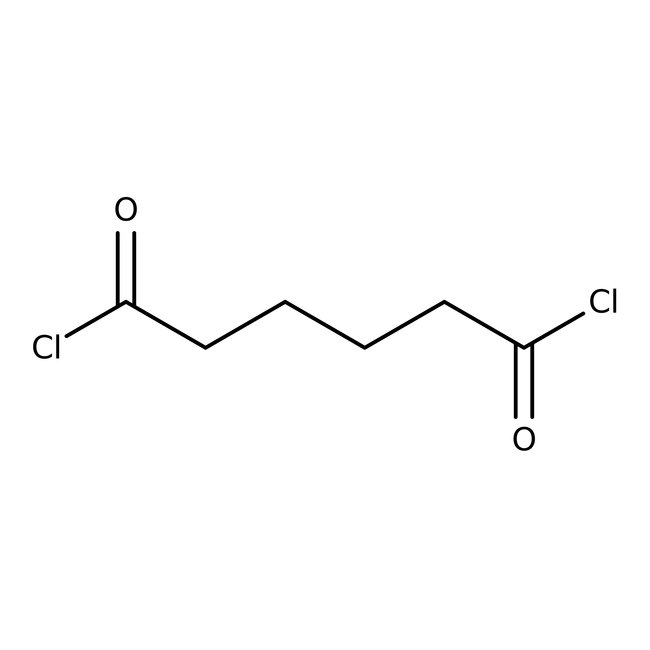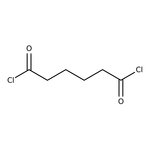Search Thermo Fisher Scientific
Thermo Scientific Chemicals
Adipoyl chloride, 98%, Thermo Scientific Chemicals
CAS: 111-50-2 | C6H8Cl2O2 | 183.028 g/mol
Catalog number ALFA13168.36
View Price:Sign InSign in to see your account pricing. Need an account? Register with us today.
Quantity:
500 g
Specifications
Chemical Name or MaterialAdipoyl chloride
CAS111-50-2
Health Hazard 1H227-H302+H312+H332-H314-H335
Health Hazard 2GHS H Statement
H314-H318
Causes severe skin burns and eye damage.
Causes serious eye damage.
H314-H318
Causes severe skin burns and eye damage.
Causes serious eye damage.
Health Hazard 3P210-P235-P260-P264b-P270-P271-P280-P303+P361+P353-P304+P340-P305+P351+P338-P310-P330-P331-P363-P370+P378q-P501c
View more
Adipoyl chloride is used in the production of nylon by reacting with hexamethylene diamine. It is also used in the preparation of biphenyl end-capped liquid crystals. Further, it is employed in the synthesis of chiral polymer for membrane applications.
This Thermo Scientific Chemicals brand product was originally part of the Alfa Aesar product portfolio. Some documentation and label information may refer to the legacy brand. The original Alfa Aesar product / item code or SKU reference has not changed as a part of the brand transition to Thermo Scientific Chemicals.
Applications
Adipoyl chloride is used in the production of nylon by reacting with hexamethylene diamine. It is also used in the preparation of biphenyl end-capped liquid crystals. Further, it is employed in the synthesis of chiral polymer for membrane applications.
Solubility
Immiscible with water.
Notes
Incompatible strong oxidizing agents, bases and acids.
Adipoyl chloride is used in the production of nylon by reacting with hexamethylene diamine. It is also used in the preparation of biphenyl end-capped liquid crystals. Further, it is employed in the synthesis of chiral polymer for membrane applications.
Solubility
Immiscible with water.
Notes
Incompatible strong oxidizing agents, bases and acids.
RUO – Research Use Only
General References:
- Al Tamimi, I. O.; Al Heeti, M. I.; Aziz, J. Z. Preparation of Dioxadiazole from Aryl Acid Hydrazide with Adipoyl Chloride. Int. J. Curr. Microbiol. App. Sci. 2015, 4 (12), 630-639.
- Dasgupta, Q.; Chatterjee, K.; Madras, G. Controlled Release of Salicylic Acid from Biodegradable Cross-Linked Polyesters. Mol. Pharmaceutics 2015, 12 (9), 3479-3489.



